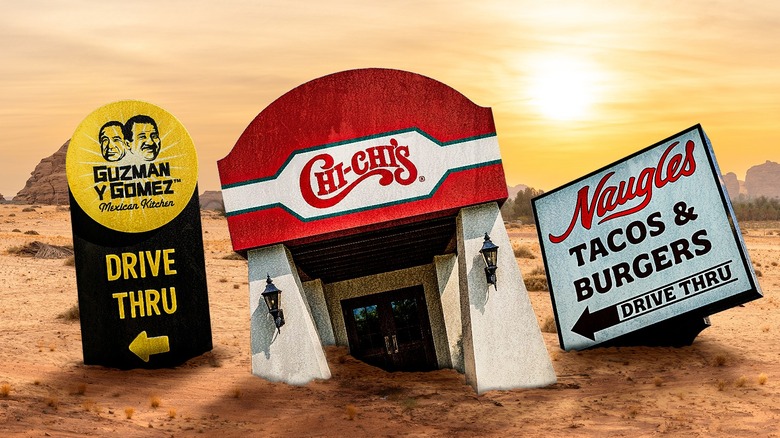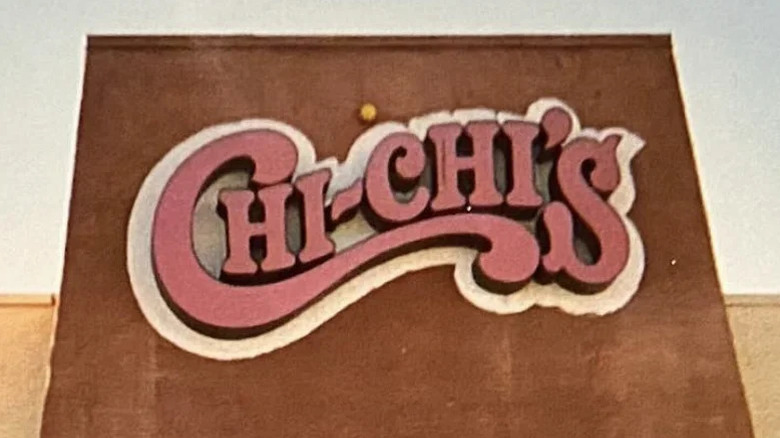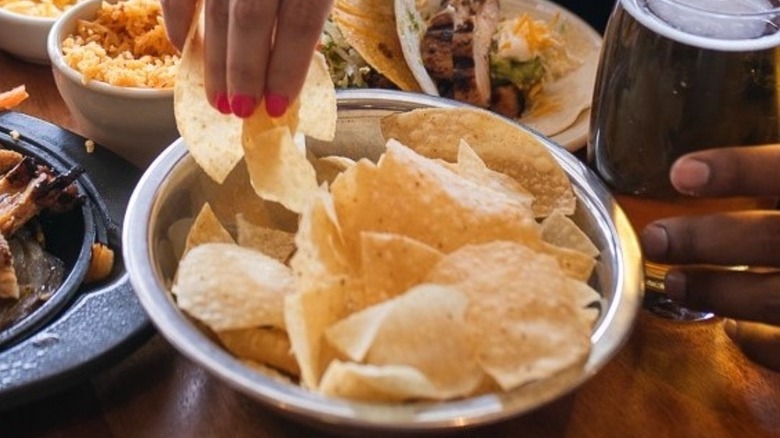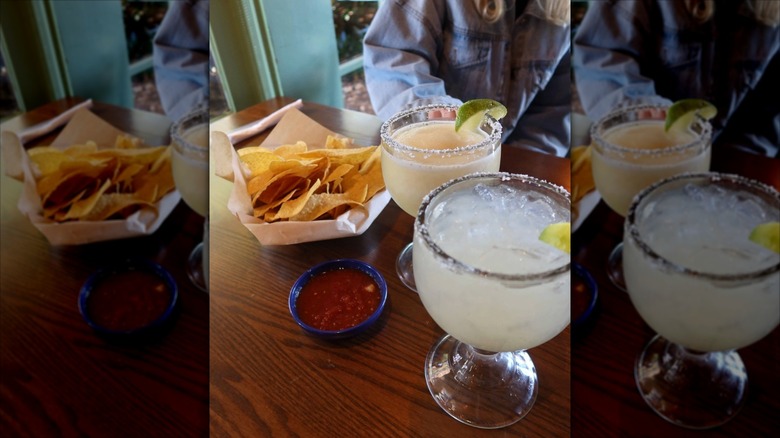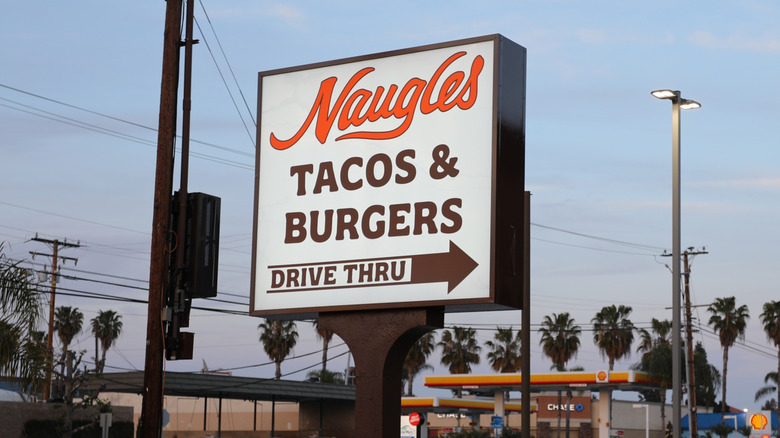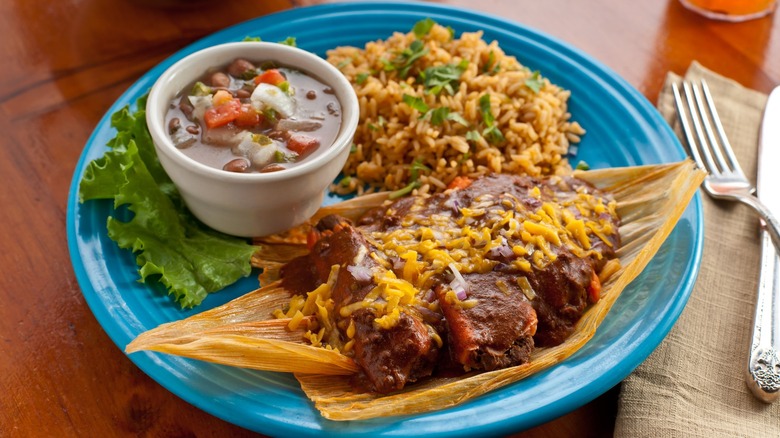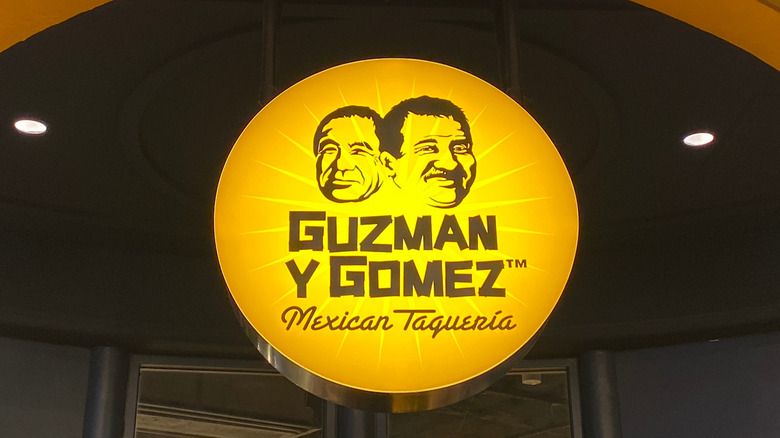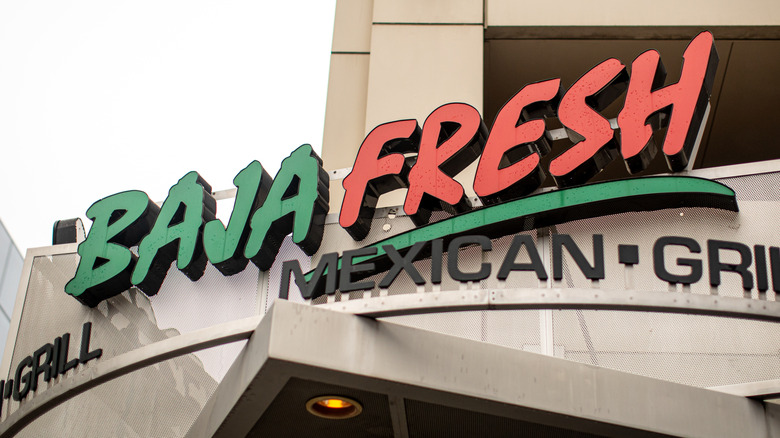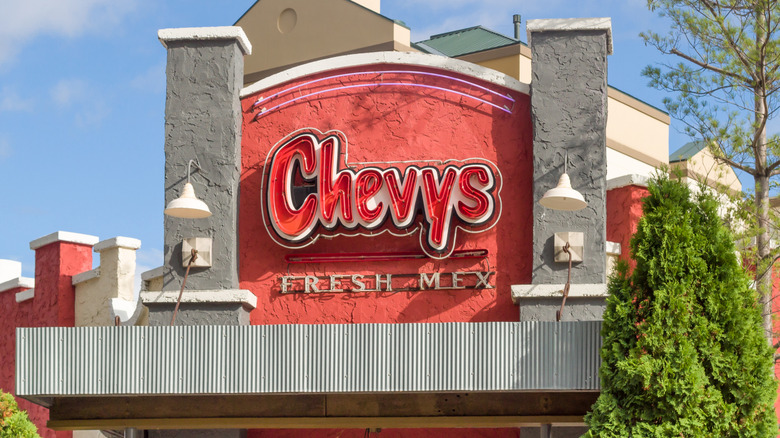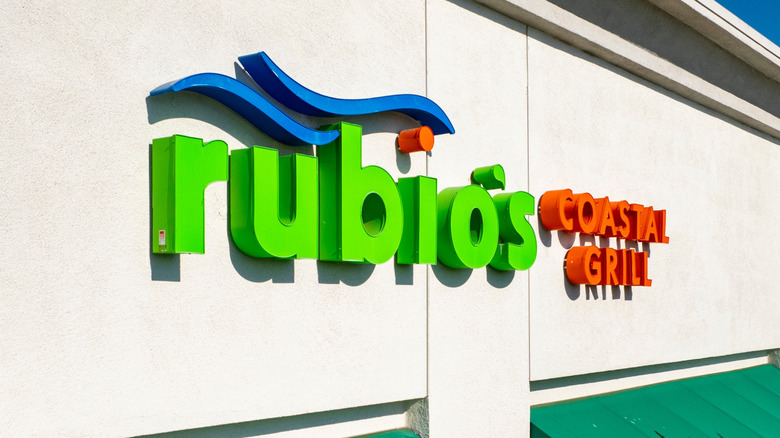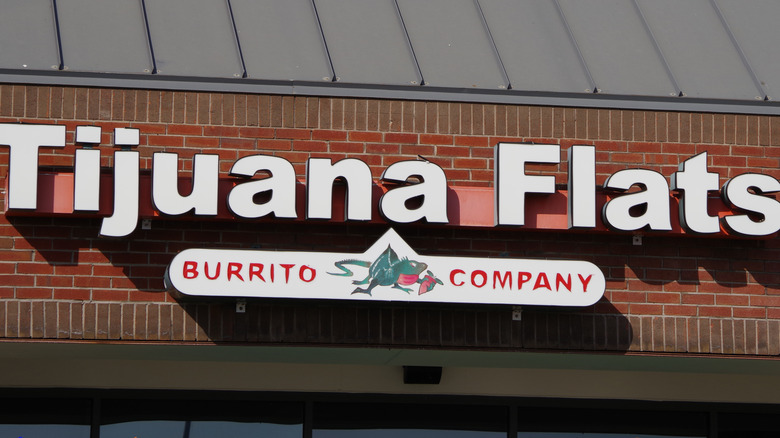Once-Popular Mexican Chain Restaurants That Now Barely Exist
Mexico is right next to the U.S., bordering multiple states. And yet, despite its proximity, it took until the late 20th century for its vast and wonderful cuisine to achieve widespread popularity north of the border. Adjacent states such as California, New Mexico, and Texas got to enjoy Mexican, Mexican-inspired, and Tex-Mex dishes well before the rest of the country did, and restaurants that established themselves there in the 1960s, '70s, and '80s worked their way around the U.S.
The result: Mexican food (or, to be more accurate, Tex-Mex food) became part of mainstream foodie culture in the U.S. There was soon an abundance of chains, both regional and national, selling both authentic and not remotely authentic foods alike, including tacos, burritos, fajitas, queso, chimichangas, and sopapillas. But the restaurant industry is forever in flux. It's highly competitive, and hard to turn a profit, and when economic realities or collective tastes change even a little, it's likely to translate into some restaurant closures.
While Mexican-inspired and Tex-Mex food have remained consistently popular for the last few decades, a few chains have gotten squeezed out of the restaurant sub-genre they helped create. Here are some of the best and some of the worst Mexican restaurant chains that were once prolific but are now a shadow of their former selves.
Chi-Chi's
It served the now-standard Mexican restaurant fare of tacos and enchiladas, but to many of the areas where Chi-Chi's opened in the United States in the 1970s and 1980s, that stuff was downright revelatory. While some of the more pandering and experimental Chi-Chi's menu items should definitely stay in the past, the Midwestern chain was one of the farthest-reaching Mexican-inspired eateries for a time, topping out at over 200 locations by the mid-1980s.
But as Americans received more Tex-Mex options, Chi-Chi's became ever more passé. By the early 2000s, its footprint had dwindled to 144 restaurants. The chain had little option but to file for bankruptcy in 2003, just a month before things became truly tragic. The Chi-Chi's controversy you totally forgot about led to the deaths of four people and at least 650 people becoming very sick. A Pennsylvania Chi-Chi's had used green onions laced with hepatitis A in its dishes. Staring down potentially hundreds of lawsuits, Chi-Chi's shut down all locations in 2004, and its name lived on only as a line of salsa products.
Two decades later, however, Chi-Chi's is almost inexplicably attempting a second act. Michael McDermott, son of an original Chi-Chi's founder, created a new company known as Chi-Chi's Restaurants LLC and opened a brand new restaurant in the Minneapolis area in 2025, with a second location planned for Maple Grove, Minnesota.
Abuelo's
The notion of food made in an old-fashioned style is embedded in the name Abuelo's — that's Spanish for "grandfather's." First serving the Amarillo, Texas, area in 1989, Abuelo's purportedly sold the same dishes one might actually find in Mexico, developed from family recipes contributed by chef Luis E. Sánchez.
Over the years, Abuelo's became more of a Tex-Mex restaurant, its menu loaded with American-leaning takes on favorites such as quesadillas, chimichangas, crunchy tacos, and tortilla soup, one of the healthiest foods to order at a Mexican restaurant. Abuelo's was a successful venture — at its peak, the chain had 40 restaurants open for business.
Unfortunately, the chain began plateauing in 2009. Economic issues sustained by many restaurants during the COVID-19 pandemic of 2020 were especially devastating for Abuelo's, and by the end of 2024, only 20 locations remained. In 2025, the 16-outlet restaurant company filed for Chapter 11 bankruptcy protection. Executives announced that it was struggling to operate in the face of higher food costs, the difficulties in acquiring employees, and overall changing tastes among the public.
On the Border
In the crowded casual restaurant environment of the early 1980s, On the Border differentiated itself with an explicitly Tex-Mex approach. Meats were marinated in proprietary blends and prepared on mesquite-wood grills to be the centerpiece of huge meals rounded out by house-made tortillas, guacamole, and salsa.
Times were tough for On the Border as early as 2020. The restaurant tried to get ahead of the problem by bringing in a new CEO and executing a digital marketing refresh in an attempt to turn things around. Sales still fell by 3% in 2023, and 3.2% of all On the Border restaurants closed. As of that year, the company was a hearty 120 outlets strong. Within two years, a third of them went out of business, leaving the restaurant chain with 80 locations, of which 60 were owned by parent company OTBLLC and 20 were operated by franchisees.
In the wake of what were clearly serious financial issues, OTBLLC entered Chapter 11 bankruptcy proceedings in March 2025, citing over $25 million in debts owed to more than 10,000 entities. After investing $10 million in the flailing chain, Pappas Restaurants, which runs Pappasitas Cantina, successfully bid for On the Border at a May 2025 auction, making it its new, outright owner.
Naugles
Dick Naugle opened a Naugles quick-serve taco shop in Riverside, California, in 1970. By decade's end, there were three Naugles restaurants, and Naugle sold the small chain to Denny's founder Harold Butler, who led an aggressive and speedy expansion, with 225 locations by the mid-1980s. Control later changed to Collins Food International before Naugles ultimately landed with Anwar Soliman, who also bought Del Taco.
Soliman merged the two fast food restaurants together in 1988 and opted to keep the Del Taco branding and start phasing out Naugles entirely. While some Naugles menu items stuck around in the new era of Del Taco — primarily anything large and loaded with the "Macho" label — only 59 Naugles, some of which were 24-hour restaurants, remained when Soliman sold off the entire Mexican fast food operation to members of Del Taco management. One Naugles, in Carson City, Nevada, held on until 1995.
More than a decade later, Naugles superfan and food blogger Christian Ziebarth got so much attention from other Naugles diehards that he set in motion a plan to acquire the trademarks associated with Naugles. Ziebarth and his partners won a lawsuit that allowed them control of the Naugles name because Del Taco hadn't done anything with it for more than a decade. The original menu was restored and re-created, and in 2015, the first of a new generation of Naugles Tacos & Burgers restaurants opened in Fountain Valley, California. Additional restaurants opened and closed over the years, with just two remaining today: the Fountain Valley location and a restaurant in Stanton, California.
El Chico
Decades before Mexican food found a firm foothold on mainstream American culinary culture, Texas-Mexican fusion cuisine, aka Tex-Mex, was a big deal in the border state of Texas. The first El Chico opened in Dallas in 1940 and outlasted countless local competing restaurants. It grew over the decades, and after it reached 75 locations, El Chico was bought out by industrial operator Campbell Taggart in 1977. Gilbert Cuellar, part of the family that started El Chico, purchased the company back in 1983, setting out to rapidly expand and franchise the business.
That business move coincided with the rise of sit-down Mexican restaurants and a Tex-Mex fad in particular. Offering more novelty than just its food, El Chico provided company-owned and franchised restaurants with its two most important menu items, tamales and chili, and left operators to deal with the rest by purchasing local ingredients. El Chico establishments cooked all food twice a day in large batches and served it on heated plates to avoid using microwaves. Today, however, El Chico is only a minor entry in the Tex-Mex and Mexican-inspired landscape. Only 13 restaurants are open as of 2025, almost all of them in Texas and Oklahoma.
Guzman y Gomez
Not yet even 20 years old, Guzman y Gomez is a popular fast food chain that originated outside of the U.S. It serves Mexican-inspired food, and it started out in Sydney, Australia, in 2006. By 2024, it had opened 210 restaurants altogether, with 185 of them in Australia and the rest in Singapore, Japan, and the United States.
As of 2025, there are seven Guzman y Gomez restaurants in North America, all of them in the state of Illinois, focusing on the chain's stated purpose of using fresh ingredients without artificial preservatives, artificial flavors, or added colors. It also famously boasts breakfast offerings. The driving force behind Guzman y Gomez's popularity back in Australia, the Mexican-based morning menu includes breakfast burritos and tacos, scrambled egg bowls, and avocado toast.
A 2024 IPO sought to raise millions of dollars for global expansion, but by 2025, the situation wasn't looking too positive in the U.S. Losing $8.48 million in its American restaurants caused Guzman y Gomez's stock to be significantly devalued in Australia, putting plans to open as many as 15 new U.S. outlets in jeopardy.
Baja Fresh
Baja Fresh represented something new when it arrived in 1990. In a world full of Taco Bells, Baja Fresh embraced the just-from-the-farm produce of its California environs to present a healthier bill of fare, centered on chicken, beans, guacamole, and salsa. And it didn't have just one form of the condiment — its well-stocked, self-serve salsa bars offer a half dozen or so options.
In 2002, the growth potential for Baja Fresh Mexican Grill, and the notion of slightly upscale fast food — or what would come to be known as fast casual – restaurants was so undeniable that Wendy's purchased the chain outright for $275 million. The burger company acquired a network of 169 restaurants and set into motion a plan to grow Baja Fresh into a 700-unit business within five years.
But then business took a quick and spectacular downturn. By 2006, Baja Fresh had expanded to more than 400 restaurants, but had lost and continued to lose so much money that Wendy's decided to unload it at a huge loss. RD Restaurant Group bought all of Baja Fresh for just $31 million. The chain later changed hands again when Canadian company MTY Food Group bought its umbrella company, BF Acquisition Holdings, for $27 million in 2016. At the time, there were only 162 Baja Fresh outlets still open. As of 2025, it's down to fewer than half of that number. There are fewer than 80 Baja Fresh restaurants left in operation today, of which the vast majority are located in the restaurant's origin point, Southern California.
Chevys Fresh Mex
Chevys Fresh Mex quickly moved out of the suburbs of San Francisco in the late 1980s and beyond with a series of winning gimmicks. Its menu of contemporary Tex-Mex brought in customers, as did its strong signature margaritas, its pudding-like corn tomalito, and how each location made its own tortillas around the clock with El Machino, a robotic maker always in full view, just like the kitchen.
A fun restaurant concept with a large clientele, Chevys was purchased by Pepsi's Taco Bell division in 1993. It kept growing, reaching a total of 40 stores and absorbing the 66-unit Rio Bravo Cantina chain in 1999, paying Applebee's $53 million. But just a few years later, money troubles forced Chevys to file for Chapter 11 bankruptcy in 2003. Real Mex Restaurants, an operator of other successful Mexican chains, agreed to buy Chevys in 2004, but the store closures just kept coming in subsequent years. Real Mex Restaurants itself went into bankruptcy protection in 2011 and later rebranded. As of 2025, fewer than 20 Chevys Fresh Mex restaurants are still open, most of which are clustered around the San Francisco Bay area.
Rubio's Coastal Grill
With a California sensibility and menu, Rubio's Fresh Mexican Grill started out in San Diego in 1983. Utilizing fresher ingredients than many of its competitors at the time, Rubio's pivoted to fish tacos and other seafood-oriented Mexican food and changed its name to Rubio's Coastal Grill in 2015. It was around this point that Rubio's started to slowly fade away.
At the beginning of 2024, it was reported that Rubio's had closed more than 25% of its locations since 2018. The COVID-19 pandemic took its toll on the company, with dining room shutdowns, social distancing, and crowd-limiting measures inevitably affecting business. In June 2020, it closed 12 restaurants in Colorado and Florida, before declaring bankruptcy toward the end of the year.
Rubio's remained a fixture on the scene but filed for bankruptcy again in 2024. In June 2024, 48 Rubio's restaurants permanently closed — a significant chunk of all remaining locations — blaming a rise in the state's minimum wage law that made it too costly to operate. As of October 2025, it has just over 80 restaurants across Arizona, California, and Nevada.
Tijuana Flats
Armed with a $20,000 loan from his father, a young Brian Wheeler opened the Tex-Mex-focused Tijuana Flats in Winter Park, Florida, in 1995. Unlike most other middle-of-the-road Mexican restaurants, Tijuana Flats dialed up the heat, with Wheeler using the growing restaurant chain to produce a series of spicy condiments and hot sauces.
In general, fast casual Mexican restaurants have performed well in the 2020s, with the industry enjoying an average annual growth of 10.5% between 2019 and 2024. Tijuana Flats wasn't getting any bigger, though, as its sales increased by just 0.1% in that same period. Facing increasing debts along with rising labor and food costs, Tijuana Flats was among the restaurant chains that closed the most locations in 2024.
Perhaps unsurprisingly, in April of that same year, Tijuana Flats filed for Chapter 11 bankruptcy, announced that it had been sold to Flatheads LLC, and that it intended to immediately shutter 11 restaurants, in addition to those that had already closed down over the previous months. In less than a year, Tijuana Flats was on the mend under its new ownership group. While many of its locations are gone for good, Tijuana Flats currently boasts 65 company-owned restaurants and 26 franchise-run ones.
